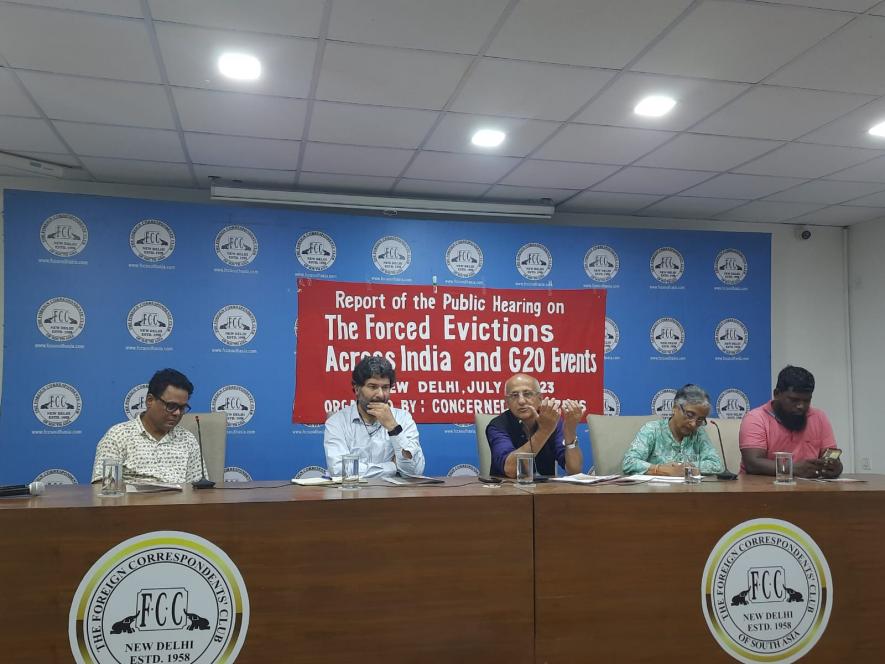Report Exposes 'Widespread Forced Evictions' During G20 Events in India

Delhi: A report focusing on recent evictions, demolitions, and compelling testimonies from the country's most marginalised individuals was released at the Foreign Correspondents’ Club on Thursday. The release was overseen by renowned social activist Harsh Mander, veteran journalist Pamela Philipose, and former Deputy Mayor of Shimla Tikender Panwar, alongside the presence of Shakil and Akbar from the Basti Suraksha Manch.
This report follows a significant public hearing conducted last month, where stories of injustice spanning the nation were heard and compiled. From the Northern regions of New Delhi and Kashmir to the Southern areas of Gujarat and Vizag, the report sheds light on the experiences of street vendors, slum dwellers, and the most impoverished communities. Notably, the report highlights the complete exclusion of the urban poor from developmental initiatives and the hardships they endure during international events hosted in the country.
Shakil, who shed light on the changing dynamics of demolitions and evictions at the event, also presented staggering statistics. "About 2.5-3 lakh individuals have been displaced due to evictions and demolitions this year. As per existing policy, individuals residing in an area for 15 years should be provided rehabilitation in the event of eviction," he said. However, there is currently no information available regarding the status of rehabilitation efforts.
This leads us to the role of the Delhi Urban Shelter Improvement Board (DUSIB), the body entrusted with the responsibility of rehabilitation and settlements. Startlingly, even the shelters provided by DUSIB this year faced demolitions. The report reveals that 15 such shelters were marked for demolition. However, following the intervention of Harsh Mander and other individuals who approached the apex court, a stay order was granted. Unfortunately, despite their efforts, the group was only able to save seven shelters, while the remaining structures were razed. The report raises concerns about the efficacy of DUSIB, both in terms of its operational effectiveness and its performance within the judicial system.
The report highlights the experiences of street vendors and individuals whose lives have been drastically impacted by the evictions and demolitions. In a distressing incident from Gujarat, street vendors were forcefully driven away and instructed to return only after the conclusion of the G20 event. Unfortunately, they were never able to reclaim their previous locations.
Regarding the legality of dwellings for the urban poor, the State seems to have an explanation for every piece of land ownership. "The poor did not choose to be illegal," stated Harsh Mander, emphasising that our cities have not been designed to accommodate the urban poor. He further added, "While the State acknowledges its obligation to provide services to the usual poor, the city lacks the capacity to legally accommodate them." The speakers expressed their sorrow over how the demolition of homeless shelters has crossed a critical threshold from the perspective of the State. Previously, during Mr Trump's visit, we concealed the poor, but now we are expelling them.
Merely two years ago, we witnessed the plight of migrant workers left stranded on the streets during the pandemic. Yet now, in a remarkably short time, the urban poor from even the smallest towns are enduring the harshest circumstances in the name of beautification and glorification of the nation's capital city. Pamela remarked, "The figure of 3 lakh, as stated by Shakil, is not insignificant. It is akin to displacing an entire small town."
The report provides an ironic example from Vizag, where the G20 meeting focused on the concept of inclusivity in urban planning. While the meeting took place, the slums were concealed entirely behind green sheets, rendering them invisible to the delegations for whom we, as Indians, act as hosts for this significant summit.
Mere days after the demolitions in Delhi, the debris has been swiftly cleared, and posters featuring the prime minister proudly proclaim, "We love G20."
Supreme Court’s Role ‘Limited’
The report also talks about how the courts have acted in case of these evictions. While for some, the higher courts were present to help out, in most other cases, either a temporary stay on the matter was given or the eviction was simply allowed.
There is a pattern when it comes to the government and the judiciary’s role in the recent demolitions. Demolitions are not new to this country, but their nature has become vicious, it said. The police start barricading the area early in the morning from all corners making it impossible for the ones who are out to get in, and the ones inside to go out. Only a limited time is given to the people to clear out their stuff. In certain cases, they are even asked to clear out within 15 minutes, claimed Akbar. While the activists ask the Supreme Court for an immediate hearing, a stay is ordered and the eviction is temporarily averted. But then, by the time this happens, some damage is already done as seen in the demolition of Kasturba Nagar and the shelters of the DUSIB.
Mander said, “The Supreme Court has become minimalistic in its role. The people can only hope for justice now.” Adding to this, the veteran journalist on the panel said, “It is a sad truth that the apex court is letting its people down. There is much more to be seen beyond the corporate model being created by the State, and recognising the most marginalised who did not choose to be illegal.”
Get the latest reports & analysis with people's perspective on Protests, movements & deep analytical videos, discussions of the current affairs in your Telegram app. Subscribe to NewsClick's Telegram channel & get Real-Time updates on stories, as they get published on our website.
























